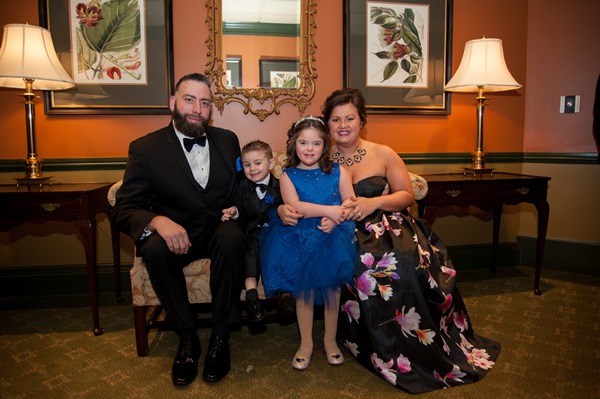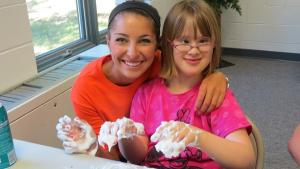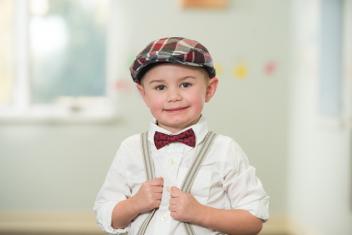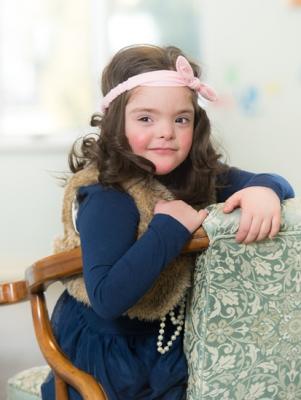Meet the Grassos, a second generation Schreiber family
July 11, 2018Starting services at Schreiber for two of her children did not create anxiety for Andrea Grasso. She had seen what Schreiber did for two of her sisters.

Andrea’s sister Ashley was born with Prader-Willi Syndrome, a rare genetic condition that creates a host of physical and developmental challenges.
“We came to Schreiber almost every day of the week for her preschool and her therapy services,” Andrea said. “It was just something I grew up with. (Schreiber is) something that’s been part of my family since she was born.”
Then her parents adopted Ariel, a little girl who had Down Syndrome. And the visits to Schreiber continued.
Fast forward a few years. Andrea met and married Nick Grasso. Nick was an only child, but that didn’t make it harder to blend in with his new family. It might have made it easier.
“Both of my sisters just love Nick,” Andrea said. “They just gravitated toward him, and he would embrace them with open arms.”
When it was time for Andrea and Nick to start a family, they were both open to children with special needs. For Andrea, it was a natural continuation of the relationships she built with her sisters as a child. For Nick, he saw they had the experiences and the resources that few adopting parents could offer.
So they adopted Mia and Giuliana, and Giuliana has Do

wn Syndrome, just like Andrea’s sister Ariel. And they have two biological sons, Paxton and Jude.
Of the four, it was Paxton’s start in life that proved to be the scariest. They had taken him home from the hospital, but at 10 days something appeared to be wrong. He was crying and fussy and not wanting to eat. At the pediatrician’s office, the doctor saw Paxton have a seizure and sent them right to Lancaster General Hospital.
The medical team there came back with the kind of news that would be any new parent’s worst nightmare.
“The doctor came in and said, ‘He has a Level 3 brain hemorrhage. We need to get him to Hershey. LifeLine will be here in 7 minutes. And you need to get to Hershey as soon as you can.'”
Andrea remembers little of what happened on the trip to Penn State’s Milton S. Hershey Medical Center.
“I know it was a whirlwind of doctors. And I remember pleading, ‘Can I please go with him? Can I please go with him?’ And they said no. And from that point on it was just a blur. We got to Hershey, and he had already been there for 15 or 20 minutes. They had him settled in a room. And he had tubes, and he was just very sick. It was terrifying. As a new mom, you have two young children at home already, and then you have this new baby, and he’s sick and you don’t know why. And you don’t know what caused it. You don’t know what happened. It’s just absolutely terrifying.”

Paxton’s stay in the hospital lasted a month and a half. While he was there, doctors placed a shunt in his brain that connects to a small tube that runs down into his abdomen. The shunt keeps any fluid from building up in his brain again.
He’s a healthy, happy little guy now. But that early bit of brain trauma left him with some sensory issues, which, in turn, create some behavior issues. He attends Schreiber’s S.T.A.R.S. Preschool and has received occupational therapy for a little more than a year.
“He was a different kid when he (first) came in,” Andrea said. “He was shy and very cautious and anxious and nervous. The progress we’ve seen, even over the last six months, is incredible. He is now so much more calm and so much more relaxed. He’s learning how to regulate himself and how to regulate his emotions. He’s learning how to deal with different sensory issues. He’s learning those coping skills.”
The progress with Giuliana has been equally remarkable.
“When we first fostered her, she was a little less than a year old,” Andrea said. “At that point, she couldn’t hold her head up, she couldn’t roll over. She couldn’t do anything. She was already delayed because of the Down Syndrome, but she was also very much delayed because of neglect.”

And now, after five years of therapy first through Lancaster County Early Intervention and then at Schreiber, she can do so much more.
“She came (to Schreiber) being not being able to say two words together,” Andrea said. “Now, she’s able to say, ‘I want this,’ or ‘I need that.’ She can say sentences. That’s huge.”
Andrea knows more than most what a difference Schreiber can make in a child’s life. She saw it with her sisters. She’s seeing it now with her son and daughter. For many families, this is one of the few places, maybe even the last place, where they can have hope. Hope that a son will live a full life free of anxiety, or a daughter will learn to talk.
“Families with children with disabilities, they hang onto (Schreiber),” she said. “People from the outside need to see what happens here. They need to see how remarkable this place is and the incredible things that come out of here.”